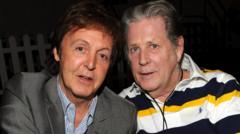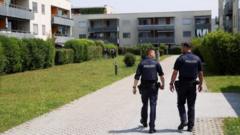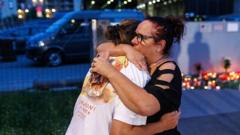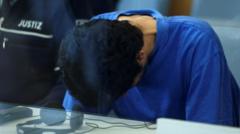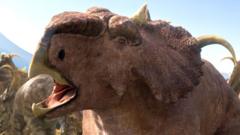The Vatican announced that Pope Francis' funeral will take place on Saturday, featuring simpler rituals in line with the pontiff's down-to-earth style. His body, laid in rest at Casa Santa Marta, will be moved to St. Peter's Basilica for public tributes before the service. Mourners across the globe are commemorating his life with memorial masses, as world leaders prepare to attend. The process for selecting his successor will commence shortly thereafter.
Funeral of Pope Francis: A Simpler Farewell to a Humble Leader

Funeral of Pope Francis: A Simpler Farewell to a Humble Leader
Pope Francis' funeral, set for Saturday, will honor his legacy with a modest ceremony, reflecting his simpler approach to the papacy.
Pope Francis’ funeral will occur on Saturday at St. Peter's Basilica, showcasing simpler rituals that resonate with his approachable leadership style. This decision to keep the ceremony modest aligns with his efforts to depart from traditional pomp associated with the papacy. Cardinal Giovanni Battista Re, the dean of the College of Cardinals, will officiate the event.
As of Tuesday, Pope Francis’ body lay in an open casket at his residence, the Casa Santa Marta, adorned in red and white vestments and holding a rosary. Starting Wednesday, the coffin will be transported to St. Peter’s Basilica to lie in state, allowing the public to pay their respects for approximately three days.
Commencing the mourning period, memorial masses celebrating the pope's life were held globally, with significant tributes in Sydney and Manila. Flags were flown at half-staff, and many nations, including Italy, Brazil, and his home country Argentina, entered days of official mourning.
Many prominent figures, including political and religious leaders worldwide, are expected to attend the funeral. Notably, former President Donald Trump confirmed his attendance, which may present logistical challenges given his accompanying entourage. The funeral marks Trump's first overseas visit in this term.
The cardinals from around the world have already begun assembling in the Vatican for the conclave, which will take place after the funeral. They will vote to elect Francis' successor, a process shrouded in secrecy that involves only cardinals below the age of 80. This conclave will significantly shape the future direction of the Roman Catholic Church, which serves 1.3 billion followers globally.
The Vatican confirmed that Pope Francis died due to a cerebral stroke and the resultant collapse of his cardiovascular system. His final wishes included a simple burial at the Papal Basilica of St. Mary Major, emphasizing modesty, much like the values he embodied throughout his papacy.
In his will, Francis expressed a desire for an undecorated tomb marked solely with "Franciscus," echoing the humble life he led—a stark contrast to the traditional grandeur of papal burials.
Francis' legacy, characterized by his focus on issues such as climate change, immigration, and inclusivity within the LGBTQ community, will be remembered by many as revolutionary. His impact, particularly in advocating for marginalized communities, continues to resonate worldwide.
As tributes pour in, the world reflects on the profound effect Francis had during his tenure, with many recalling his calls for compassion and dialogue amid global crises. His connection to his Latin American roots and steadfast commitment to pastoral care remain part of his enduring legacy.
The Vatican has given further details on attendance and arrangements for the funeral, emphasizing its importance in not just the Catholic Church but global diplomacy and interfaith dialogue, as leaders gather to bid farewell to a pope who bridged divides and championed human dignity.
As of Tuesday, Pope Francis’ body lay in an open casket at his residence, the Casa Santa Marta, adorned in red and white vestments and holding a rosary. Starting Wednesday, the coffin will be transported to St. Peter’s Basilica to lie in state, allowing the public to pay their respects for approximately three days.
Commencing the mourning period, memorial masses celebrating the pope's life were held globally, with significant tributes in Sydney and Manila. Flags were flown at half-staff, and many nations, including Italy, Brazil, and his home country Argentina, entered days of official mourning.
Many prominent figures, including political and religious leaders worldwide, are expected to attend the funeral. Notably, former President Donald Trump confirmed his attendance, which may present logistical challenges given his accompanying entourage. The funeral marks Trump's first overseas visit in this term.
The cardinals from around the world have already begun assembling in the Vatican for the conclave, which will take place after the funeral. They will vote to elect Francis' successor, a process shrouded in secrecy that involves only cardinals below the age of 80. This conclave will significantly shape the future direction of the Roman Catholic Church, which serves 1.3 billion followers globally.
The Vatican confirmed that Pope Francis died due to a cerebral stroke and the resultant collapse of his cardiovascular system. His final wishes included a simple burial at the Papal Basilica of St. Mary Major, emphasizing modesty, much like the values he embodied throughout his papacy.
In his will, Francis expressed a desire for an undecorated tomb marked solely with "Franciscus," echoing the humble life he led—a stark contrast to the traditional grandeur of papal burials.
Francis' legacy, characterized by his focus on issues such as climate change, immigration, and inclusivity within the LGBTQ community, will be remembered by many as revolutionary. His impact, particularly in advocating for marginalized communities, continues to resonate worldwide.
As tributes pour in, the world reflects on the profound effect Francis had during his tenure, with many recalling his calls for compassion and dialogue amid global crises. His connection to his Latin American roots and steadfast commitment to pastoral care remain part of his enduring legacy.
The Vatican has given further details on attendance and arrangements for the funeral, emphasizing its importance in not just the Catholic Church but global diplomacy and interfaith dialogue, as leaders gather to bid farewell to a pope who bridged divides and championed human dignity.




